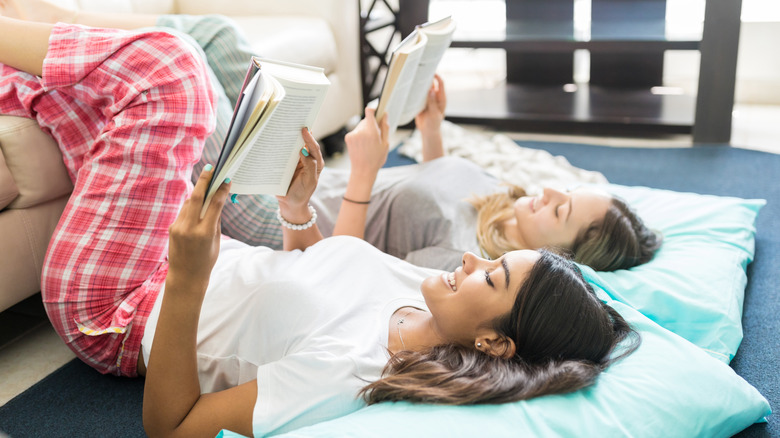Parallel Play Is A Low-Maintenance But Important Aspect Of Friendships You May Be Neglecting
Making extravagant plans with your friends is all well and good, but sometimes don't you just want to chill out together?
The truth is, you don't always need a grand game plan when hanging out with a friend. Big ambitious plans every day of the week can equal exhaustion and cause over-stimulation, especially if you're an introvert rather than an extrovert. Despite popular belief, having that downtime doesn't mean you need to cut off your social life. In fact, some of the best friendships are the ones where you can lay on the couch doing your own thing in the comfort of one another's company.
The idea of hanging out with a friend but minimally interacting may sound a little bit wild, but being alone together (i.e. parallel play) can actually strengthen relationships by adding a level of comfort and quiet intimacy that going out for drinks or getting together for manis and pedis doesn't offer. It also takes away the pressure of always being on while spending time with another person. There are a variety of ways to practice parallel play, so what exactly is it and how can you use it in your friendships?
What is parallel play?
Parallel play, commonly referred to as being alone together, is a form of spending time with friends and family where you and the other party do separate activities or the same activity separately. For example, you invite your friend over and journal while they color a picture. Even though you aren't actively having a non-stop conversation or doing the same activity, you're still enjoying each other's company. The relaxed comfort that parallel play ignites can actually strengthen friendships.
Children instinctually fall into the practice of parallel play during the early stages of play development, usually occurring when they're around two years old. Some parents worry that playing near but not with others means that their child is antisocial, but really, children are greatly benefitting from this stage of play. It encourages better motor skills, communication skills, emotional expression, sharing, and the understanding of boundaries.
Of course, most adults have established motor and communication skills. However, that doesn't mean they can't benefit in other ways. This type of hangout is perfect for the person who wants to socialize without feeling drained afterward. It can also enhance creativity while fostering a deeper and safer connection with yourself and your buddy. And although many more studies have been done on children regarding parallel play, a study conducted in 2017 about social reward and oxytocin proved that at any age, doing an enjoyable activity with another person present promotes more dopamine, a neurotransmitter that allows you to feel pleasure, than doing that same activity solo.
How to add parallel play into your friendships
Parallel play can easily be added to your friendships for a carefree and intimate experience. You don't have to be a fan of quiet hobbies such as reading or journaling: parallel play can look different for everyone. It can include video games, puzzles, exercising, baking, gardening, or art — just about anything you can think of. As long as you're both separately working on personal projects while spending time together, you've nailed the concept.
Try this out with a friend that you already feel comfortable with — particularly one that doesn't feel the need for a proper host while visiting. Everyone has that friend that can walk in without knocking and help themselves to whatever is in the fridge. They are the perfect candidate for parallel play. Of course, this type of interaction with your friends can feel awkward at first because adults aren't conditioned to having someone over so that they can work on a project or hobby solo, but soon after starting you and your parallel play partner will get into your individual grooves and start enjoying the cozy mellow vibe of the room.
Say "bye-bye" to combatting FOMO and total guilt for not going out, and say "hello" to soul-soothing parallel play.


